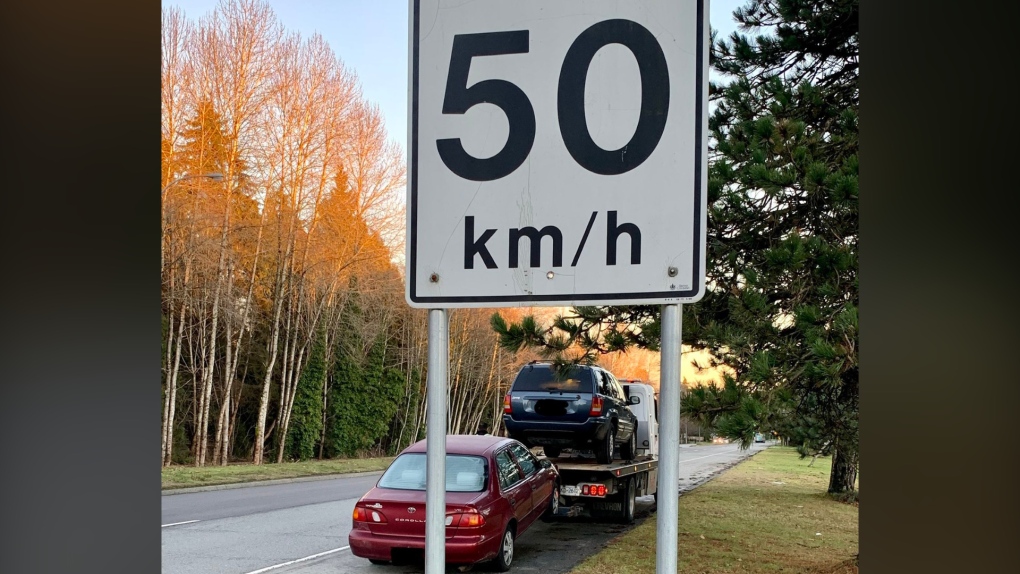Driver blames Vancouver cop for 'hiding in the bushes' after being clocked at twice the speed limit
 A photo posted by the Vancouver Police Department's Sgt. Mark Christensen shows a vehicle being towed after the driver was allegedly caught speeding.
A photo posted by the Vancouver Police Department's Sgt. Mark Christensen shows a vehicle being towed after the driver was allegedly caught speeding.
Sixty-two extra kilometres per hour is costing one dangerous driver $368, and one week without their Toyota Corolla.
Vancouver Police Department Traffic Unit Sgt. Mark Christensen posted a picture of the red car being towed on Twitter late Thursday. In the foreground, a big 50 stands out on the speed limit sign.
“When you are racing along SW Marine doing 112 km/h as the speed limit reduces to 50, you likely shouldn’t blame the cops for 'hiding in the bushes'…I was standing by the sign!” Christensen wrote.
The Vancouver Police Department told CTV News the driver is 26, and was pulled over near Camosun Street.
Police can impound vehicles for excessive speeding, which is defined as a speed greater than 40 km/h by the Motor Vehicle Act. The penalty for one speeding ticket can range between $138 to $483, depending on the offence, and three penalty points to the driver’s record.
On top of the fine, which gets higher depending on the offender’s speed, the driver will have to pay for towing and storage fees at the impound lot, and will have three penalty points on their driving record.
On Twitter, as his handle @baldguy1363 might suggest, Christensen often posts humorous quips about driving failures to his roughly 1,500 followers, though the dangers of speeding are no joke. According to RoadSafetyBC, speed is the leading cause of death on B.C. roads, accounting for an average of 82 deaths per year.
Data by DriveSmartBC shows that in 2021, the highest speeding ticket was 181 km/h in a 60 zone. The same year, speeding fines in Vancouver totalled $14,461,182, with funds going to support community safety and address local policing priorities.
CTVNews.ca Top Stories

Expert warns of food consumption habits amid rising prices
A new survey by Dalhousie University's Agri-Food Analytics Lab asked Canadians about their food consumption habits amid rising prices.
Documents reveal Ottawa's efforts to get Loblaw, Walmart on board with grocery code
It was evident to the federal government as early as last fall that Loblaw and Walmart might be holdouts to the grocery code of conduct, jeopardizing the project's success.
opinion The special relationship between King Charles and the Princess of Wales
Royal commentator Afua Hagan writes that when King Charles recently admitted Catherine to the Order of the Companions of Honour, it not only made history, but it reinforced the strong bond between the King and his beloved daughter-in-law.
Charlie Woods, son of Tiger, shoots 81 in U.S. Open qualifier
Charlie Woods failed to advance in a U.S. Open local qualifying event Thursday, shooting a 9-over 81 at Legacy Golf & Tennis Club.
Improve balance and build core strength with this exercise
When it comes to cardiovascular fitness, you may tend to focus on activities that move you forward, such as walking, running and cycling.
'I just want to be safe': Ukrainian man in Canada faces limbo amid consular freeze
A recent decision to restrict consular services for fighting-aged Ukrainian men has made a Ukrainian man in Canada feel less certain of his next steps — and worried he could be pulled back to the war.
B.C. tenants evicted for landlord's use after refusing large rent increase to take over neighbouring suite
Ashley Dickey and her mother rented part of the same Coquitlam duplex in three different decades under three different landlords.
Mountain guide dies after falling into a crevasse in Banff National Park
A man who fell into a crevasse while leading a backcountry ski group deep in the Canadian Rockies has died.
Dozens of U.S. deaths reveal risks of injecting sedatives into people restrained by police
The practice of giving sedatives to people detained by police has spread quietly across the U.S. over the last 15 years, built on questionable science and backed by police-aligned experts, an investigation led by The Associated Press has found.

































